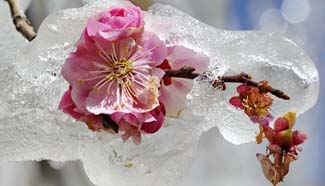
On Sept. 3, the Beijing sky was clear and bright and the national flag was waving in the air.
At 10:20 a.m., on the first sounding of the review horn, a Hongqi limousine carrying President Xi Jinping pulled out of Tiananmen Gate to commence his review of China’s troops.
It was the first time that a Chinese military review was themed on a commemoration of the victory in the Chinese People’s War of Resistance against Japanese Aggression and the World Anti-Fascist War. It was also the first time President Xi had reviewed the country’s armed forces in Tiananmen Square.
This grand scene evoked memories of the same date 70 years ago, when the Chinese people defeated the invading Japanese at a cost of 35 million Chinese casualties. It was China’s first complete victory against foreign invasion in modern times. That victory is still honored by the Chinese people, as are the martyrs.
The three armed services neatly lined up along Chang’an Avenue, their colors vibrant in the sun. Meanwhile, 200 military aircraft assembled in takeoff formations at eight military airports in north China.
When the review car drove past the Golden Water Bridge, Song Puxuan, parade commander-in-chief, stepped up to the President and reported: “Mr President, the parade troops are ready. Please start the review.”
“Begin!”
On hearing the order, the thousand-strong military band began to play stirring marching tunes. Bathed in the golden sunshine, the limo drove the president eastward.
“Greetings, comrades.” -- “Greetings, leader.” -- “Comrades, you are working hard.” -- “We serve the people.” The president and the troops saluted each other loudly and rhythmically.
The Chinese people will be remembered for their resistance against Japanese invasion after the Mukden Incident in 1931, the prelude to the global war against Fascism; for the nationwide war of resistance following the July 7th Incident in 1937, which developed the main Eastern battlefield; and for their indelible historic contributions to the eventual defeat of Fascist forces.
It was the Communist Party of China (CPC) - with the utmost resolution and courage to fight for national independence, to safeguard the nation’s interests, and to repel the foreign invasion - that held high the banner of resistance at the critical moment of the Chinese nation's survival. It became the mainstay of the nationwide war of resistance.
Seventy red flags arrayed radiantly along Chang’an Avenue inspired PLA formations to carry forward the spirit of the resistance war. They recalled the hero unit formations, including the Five Heroes on Mount Langya, the Spearhead Company in the Battle of Pingxingguan, and the Hand-to-Hand Fighting Company in Hundred Regiments Battle. The martyrs can rest in peace, assured their successors are working hard to improve combat effectiveness, striving to make breakthroughs in cutting-edge technologies and risking their lives to help people in face of accidents and disasters.
“Greetings, comrades.” -- “Greetings, leader.” -- “Comrades, you are working hard.” -- “We serve the people.”
The salute reflected firm bond between the supreme commander and the troops.
The president passed one formation after another, and the officers saluted with their eyes. All personnel swelled with pride. The president has been paying great attention to the needs of grass-roots personnel. He greets them, shakes hands and talks with them across the country, from a launch base in the Gobi desert to snow-covered frontier sentry posts.
The president’s concern has consolidated the troops’ determination to follow the CPC. Lined up on Chang’an Avenue, their youthful faces were filled with loyalty and determination. Today, they were reviewed by the country and the people.
“Greetings, comrades.” -- “Greetings, leader.” -- “Comrades, you are working hard.” -- “We serve the people.”
The salute showed China’s unwavering resolve to guard peace.
The tanks, cannons and guided missiles were arrayed in grand formations, glistening in the sun. More than 500 pieces of China-made armaments fell into six categories – ground assault, air defense anti-missile systems, naval attack, strategic strike, information support, and logistical support. About 84 percent of them were on public show for the first time.
“Greetings, comrades.” -- “Greetings, leader.” -- “Comrades, you are working hard.” -- “We serve the people.”
President Xi’s warm greetings and the unequivocal reply reflected a strong army that is continuously gaining momentum.
The revival of Chinese nation and national prosperity with a strong army has been a constant goal throughout China’s modern history. Today that long-time aspiration and the ideal fought for by righteous people is closer than ever.
History has taught us that only a strong army and a reinforced national defense can guarantee the Chinese dream. To achieve national rejuvenation, the president has ordered the building of a strong army in line with the national strategic “Four Comprehensive” structure, and acceleration of the modernization of national defense.
President Xi has been formulating the blueprint for major military reform and directing key military operations since the 18th CPC National Congress. In order to lead the PLA on the path of a strong army, President Xi has strengthened military discipline and punished violations, and resolutely promoted the rule of law in the army. Every officer bears in mind the goal of building a strong army and working hard to accomplish it. The reform continues in an orderly fashion. The PLA, with its 88-year history, is scaling new heights.
To commemorate the past and victory, it paves the way for a better future and sustained peace.
The limo finished the review and returned to Tiananmen Square at 10:30 a.m., when the troops hailed in one voice: “Follow the Party’s command, high combat effectiveness, strict discipline and excellent work-style…”
This is the peace proclamation of the people’s army.
This is the Chinese people’s steadfast determination for national rejuvenation.










